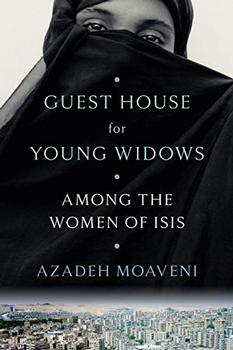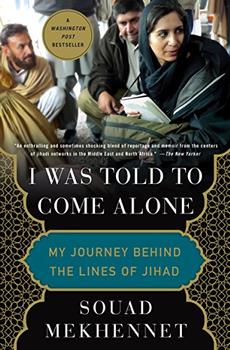Summary | Excerpt | Reviews | Beyond the book | Read-Alikes | Genres & Themes | Author Bio

Ordinary Women and Men Fighting Extremism in Africa
by Alexis OkeowoWhen places in Africa are mentioned in the news, many outsiders visualize the entire continent, not realizing that it is home to 54 currently recognized nations of extremely wide cultural, religious, geographic, and language diversity. A Moonless, Starless Sky: Ordinary Women and Men Fighting Extremism in Africa is an ambitious and successful account of current affairs in Uganda, Nigeria, Mauritania, and Somalia, brimming with keen human-interest stories. Alexis Okeowo, who writes for The New Yorker, is a powerful storyteller with a journalist's instinct for detail and a humanitarian's dedication. She is fearless in pursuit of true and nuanced moments. Here, she profiles ordinary people rising to heroic actions while confronting danger in their communities; the result is a solid attempt to record the history and lives of those whose stories have never been told.
Two of the people profiled are Eunice and Bosco, a couple building a new life for themselves in Uganda. They were abducted as children to serve in the insurgent Lord's Resistance Army (LRA) led by Joseph Kony. Mainstream media has widely reported the menace wrought by the LRA in Uganda and neighboring Congo and South Sudan, but what's remarkable here is Okeowo's sensitive literary portrait of Eunice and Bosco. Although they – and many others – have escaped the LRA, returning home is complicated. And, although Ugandans are rebuilding their communities, Kony remains a fugitive, on the world's most-wanted list for crimes against humanity.
American-born daughter of Nigerian immigrant parents, the author lived for several years in Lagos, Nigeria as a "repat" (someone who returns to the mother country their parents left behind). This unique vantage point – and being black and female – powers Okeowo's journalistic storytelling, and opens certain doors that might be otherwise closed to American journalists. Her narrative especially shines when it dips into memoir, revealing personal feelings about the process of investigative journalism, and contemplating larger themes: inherited trauma, poverty, education, religious intolerance, and women's rights:
I was also once an African girl, like Eunice. And, but for the grace of fate, I could have been born outside of Gulu instead of the sprawling, hot state of Texas…Ugandans assumed I was one of them until I opened my mouth to speak, and I reveled in being able to blend in and move around mostly unnoticed.
Okeowo spotlights many other quiet heroes. In northern Nigeria, citizens take the law into their own hands to resist the Boko Haram jihadist insurgency. Readers may have heard about Boko Haram because the 2014 abduction of nearly 300 schoolgirls was widely reported in mainstream media. Okeowo ventures behind the headlines, interviewing Rebecca, a girl who was taken but managed to escape. Okeowo also features Elder, a man who started the Civilian Joint Task Force (CJTF), an armed "neighborhood watch" system to fight Boko Haram when the government's efforts fell short. This story is still breaking – many girls remain captive and other children are being abducted while Boko Haram's reign of terror expands.
Okeowo also profiles antislavery champion Biram Dah Abeid who lives in the West African nation Mauritania. Slavery was abolished there in 1981 but continues to exist in practice. (See Beyond the Book.) Okeowo examines the complex cultural history of slavery in Mauritania, and the ongoing struggles of Biram and his group to abolish it despite spending time in prison and receiving death threats.
Readers are introduced to young athletes Aisha and Ilhan, who want to play basketball in Somalia, where al-Shabaab militants in power demand that women stay home and stay covered. The girls compete in a basketball league, despite needing to wear an excessive amount of clothing on the court. After their friend Faiza's brutal murder, their need for their basketball outlet becomes even more clear: "Somalia would lose something important if they let the militants take the few things women had to themselves, the releases and the joys."
This is an essential read for our times and will appeal to book groups, scholars of modern Africa, and those who appreciate literary journalism. A Moonless, Starless Sky bears witness to the unbearable and reveals a young journalist's quest to illuminate injustice and, more essentially, to inspire hope in these desperate times. I only wish the publisher would include maps and timelines of events. Despite that, I hope that Okeowo continues to report from places beyond the headlines.
![]() This review was originally published in The BookBrowse Review in October 2017, and has been updated for the
October 2018 edition.
Click here to go to this issue.
This review was originally published in The BookBrowse Review in October 2017, and has been updated for the
October 2018 edition.
Click here to go to this issue.

If you liked A Moonless, Starless Sky, try these:

by Azadeh Moaveni
Published 2019
A gripping account of thirteen women who joined, endured, and, in some cases, escaped life in the Islamic State—based on years of immersive reporting by a Pulitzer Prize finalist.

by Souad Mekhennet
Published 2018
"I was told to come alone. I was not to carry any identification, and would have to leave my cell phone, audio recorder, watch, and purse at my hotel..."
The only completely consistent people are the dead
Click Here to find out who said this, as well as discovering other famous literary quotes!
Your guide toexceptional books
BookBrowse seeks out and recommends the best in contemporary fiction and nonfiction—books that not only engage and entertain but also deepen our understanding of ourselves and the world around us.